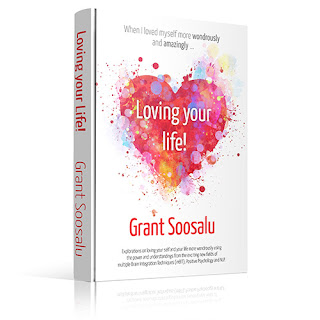The reality is that love is a verb, it’s a process... loving is something that you do.
Being aware of this is really important. It allows you to realise that loving is a skill, it’s a process that you can learn to do better. It’s also a process that requires focus and attention... and if you don’t give loving any focus, then you won’t do as much or as well as you'd like. And this is vitally important for loving your self, loving others and for loving and enhancing your life.
One of the outcomes for this blog is that it's a guide and tool for helping you focus on aspects of enhancing and loving your self and your life more. It helps you open your heart to parts of your life that you can support, enhance and love more fully. It’s like a spotlight that you can use to enlighten parts of your self. At the same time it teaches you how your mind and body works by explaining these aspects in terms of recent advances in the fields of Positive Psychology and Neuro Linguistic Programming (NLP).
So I hope you've been enjoying the blog and getting continued value out of reading it. I also hope it challenges you and gets you to think in new ways. At the very least, I hope it reminds you of important ideas and distinctions you can use every day to enhance your life and the lives of those you love.
Denominalising Love
In NLP terms, 'love' is a nominalisation - a verb that has been disguised as a noun. To think and live sanely, it is very very useful to denominalise such sneaky nouns back to their active verb (doing word) form. The reason why this is important is that words and concepts are the tools you use to generate meaning and create and communicate your reality. And when you use nouns versus verbs, you use a very different part of your brain and create a very different reality.
I'll be blogging on a fascinating story about what happens when you lose the part of your brain that does 'noun-ing' versus 'verb-ing' and show you some brain scans of how the different word forms use very different components of the brain. The key insight however is that whenever you use a noun - a word for an 'object' or 'thing' - you trigger the parts of the brain that are responsible for objects and their properties. Whereas, when you reconnect your language back to the verb (action) form, you trigger the parts of your brain responsible for processes.
Objects are things that you can easily own and take for granted. They stay relatively constant. Processes on the other hand, have outcomes and personal agency associated with them. Love as a noun, is a fixed and static thing.
Loving as a verb, is a skill and a process that requires attention and focus. The actual parts of your brain associated with how you think about this are crucially different.
Focus on Loving
So Remember, you don't 'have' love, you do loving, and it's important you put your focus onto the process and skills of loving.
Think right now of the 3 most important people in your life and decide how you can do more exquisite and powerful loving with them. What can you do to show them they are important and tell them how you feel about them? What are some actions you can take with or for them that will be life enhancingly loving for them?
When you first met them, how did you feel, act and communicate with them? What can you do now that you did back then, that is so very loving? How can you support them? How can you delight them?
Do Loving!
It's true that 'loving is, as loving does' so put more life enhancing loving into your life right now!
hugs and lovings
Grant
And if you'd like to learn more about how to love your life more wondrously, check out my new book:
Or you may find the following books interesting and useful for learning strategies about how to do more and better loving in your life:
The 5 Love Languages: The Secret to Love That Lasts
While working as a marriage counselor for more than 30 years, Dr. Gary Chapman identified five key love languages: Words of Affirmation, Quality Time, Receiving Gifts, Acts of Service, and Physical Touch. In a friendly, often humorous style, he unpacks each one. Some partners crave focused attention; others need regular praise. Gifts are highly important to one person, while another sees fixing a leaky faucet, ironing a shirt, or cooking a meal as filling their criteria for loving. Some partners might find physical touch makes them feel valued: holding hands, giving back rubs, and sexual contact. Chapman illustrates each love language with real-life examples from his counseling practice.
Falling in love with your life
A personal guide to fall in love with the person who is going to be with you throughout your life: Yourself! A wonderful, inspiring and energizing book applying NLP to loving your self and your life.
NLP and Relationships
In this first NLP book to focus on love relationships, expert trainers O'Connor and Prior show how to find and nurture any relationship.



Love this Grant, thanks mate. :)
ReplyDeleteregards
Matt brown